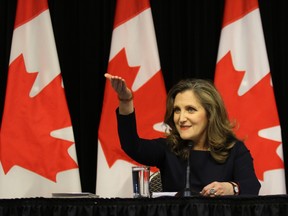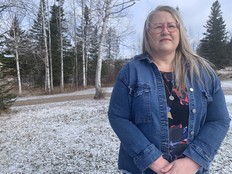How many New Brunswickers will actually pay more in capital gains tax?
Ottawa anticipates that just 300 people in New Brunswick, less than 0.04 per cent of the population, will have capital gains above $250,000

Article content
OTTAWA • The feds contend it’s a tax increase that will only impact the country’s wealthiest 0.13 per cent with an average income of $1.42 million, and then roughly 12 per cent of Canada’s corporations.
And it’s an ever smaller number in New Brunswick.
Ottawa’s internal projections, provided to Brunswick News, anticipate that just 300 people in New Brunswick, less than 0.04 per cent of the population, will have capital gains above $250,000 in the fiscal year ahead.
Meanwhile, only 1.7 per cent of the 307,000 corporations reporting net capital gains in 2022 were located exclusively in New Brunswick.
The math suggests that the tax hike the Trudeau government is using to pay for billions in new federal spending – to build more homes, expand child care, beef up the military, launch a national pharmacare plan, and develop a national school food program, among a list of other initiatives – is targeted at very few in this province.
Still, economists in New Brunswick are suggesting the impact is much broader while raising alarm of future fallout.
Few rich in New Brunswick
Currently, 50 per cent of an individual or business’s capital gains – the profits made from selling an asset like a stock or a second home in a given year – are taxable as income.
As of June 25, two-thirds of capital gains over $250,000 will be taxable under new rules introduced in the 2024 federal budget.
The feds anticipate the move will bring in an extra $6.5 billion in revenue next year, roughly $5 billion of that from corporations.
It’s expected to bring in an extra $19.4 billion over five years.
The impact of that move is up for debate.
“Many economists prefer a lighter tax treatment of capital gains compared to other forms of income because it is linked to investment and, in general, we want investment,” said David Campbell, president of Jupia Consultants Inc. and the province’s former chief economist.
“I’ll just say I think there is a limit to how much you can squeeze out of high income earners before you get negative effects.”
Campbell prefaced his comments by noting that there’s different kinds of investing: A big capital gain on income from investing in startup companies is arguably more influential to the economy than gains due to a real estate bubble.
“Also, as I have said many times, New Brunswick needs more high income earners,” Campbell said. “If we had more, it would put less tax burden on lower income classes.”
The numbers are eye opening.
Provincial and federal governments get less than 11 per cent of total income taxes out of the top one per cent in New Brunswick, whereas they get 22.5 per cent – more than double – out of the top one per cent across the country.
Nationally, the top five per cent pay just under 42 per cent of income taxes.
In New Brunswick, it’s less than 25 per cent.
The province simply doesn’t have the volume of high earners other province’s do.
“In this province we should have policies and economic development efforts to boost income at the top to relieve the rest of us from higher taxes,” Campbell said.
Investing in startups
It ultimately means that there are fewer people in New Brunswick in a position to invest.
Targeting them with higher taxes raises fears of an impact on investment and entrepreneurship that might even compel some of the province’s talent and startups to take their business elsewhere.
“There’s no question that we’re already hearing from businesses that are in the startup world that are very concerned,” said Louis-Philippe Gauthier, the New Brunswick director of the Canadian Federation of Independent Business.
“Angel investors are openly asking ‘Are we going to be investing?’”
Gauthier said entrepreneurs are also worried about dollars already invested as the tax changes don’t kick in until late June, meaning investors may want to cash out early.
“I can guarantee you that there’s a whole series of people who are talking to their accountants right now,” he said. “The unfortunate reality is that there’s nothing more nervous than a dollar when it comes to investment.”
But Gauthier says the ultimate fallout is unknown.
And on the overall, he believes that the changes will see most small business owners in New Brunswick unaffected or come out ahead as the budget also includes changes providing a boost in the lifetime capital gains exemption.
Further repercussions
Herb Emery, the Vaughan Chair in economics at the University of New Brunswick, added that many more New Brunswickers could face tax increases for a year where they have a big financial event, such as the sale of an investment property, family cottage or a large one-time selloff of a person’s retirement portfolio.
“It’s going to penalize the cottage owner,” he said.
Meanwhile, Emery suggests the feds won’t rake in the high levels of new revenue that they’re banking on.
“If you can restructure the timing of your sale or how you’re going to do it, it may be that you keep everything under the threshold,” he said.
He added that it could then represent a first step to an even larger tax change.
“It does start to open the door to thinking about why we are exempting capital gains on principal residences when a lot of people are making a small fortune,” Emery said.
He references a call by Paul Kershaw, policy professor at the UBC School of Population Health, who says the housing wealth of older generations is contributing to housing insecurity among younger generations.
Kershaw suggests a tax on houses being sold over $1 million, as their owners are now reaping excessive gains from homes they originally paid comparatively little for in the past.
“We should be taxing some of that major increase as a capital gain,” Emery said.
“If the government really wants to make housing affordable, we really need to stop sheltering principal residences over preferred investments over things like stocks and bonds.”












Postmedia is committed to maintaining a lively but civil forum for discussion. Please keep comments relevant and respectful. Comments may take up to an hour to appear on the site. You will receive an email if there is a reply to your comment, an update to a thread you follow or if a user you follow comments. Visit our Community Guidelines for more information.